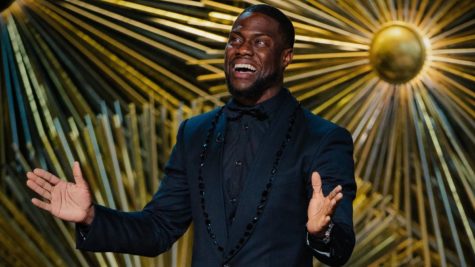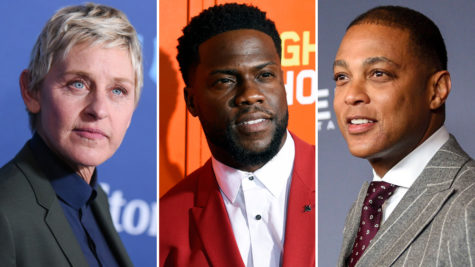The Kevin Hart Oscars Controversy
March 18, 2019
Amid the exciting buzz of Oscar nominations, a major controversy emerged when homophobic tweets and comments from the chosen host, Kevin Hart, resurfaced. In 2010, Hart stated, “As a heterosexual male, if I can prevent my son from being gay, I will.” He also referred to an image of Damien Dante Wayans, an actor and director, as “a gay billboard for AIDS.” In 2011, Hart tweeted that if he ever found his son playing with a dollhouse, he would tell him, “stop that’s gay,” and break the dollhouse over his son’s head. Immediately following the backlash, Hart responded to the controversy with an Instagram video stating “We feed on internet trolls and we reward them. I’m not going to do it, man. I’m going to be me. I’m going to stand my ground.” Kevin Hart blatantly refused to apologize, simply stating “I chose to pass. I passed on the apology. The reason I passed is because I’ve addressed this several times.” Ultimately, Kevin Hart chose to step down from hosting the Oscars and tweeted “I sincerely apologize to the LGBTQ community for my insensitive words from my past”.

From celebrities to politicians, modern technology has built bridges and provided a popular vehicle for instantly broadcasting an individual’s innermost thoughts and opinions to the entire world. This technological development has resulted in increased transparency for public figures. Even though tweets can be sent on a whim and are not always indicative of a person’s entire character, in today’s world, tweets do not, and frankly should not go away. Technology has also allowed celebrities to use their platform for change, something Hart could have and should have done. He had the opportunity to apologize as soon as the tweets resurfaced, to explain why he said those hurtful things in the past and how he has evolved since then, and to use his position as the Oscar host to advocate for LGBTQ rights and to be an ally for the gay community.
After Hart stepped down from hosting the Oscars, the controversy dulled and was soon replaced by speculation about who would host the event instead; however, on January 4, 2019, Kevin Hart appeared on The Ellen DeGeneres Show. Degeneres, an LGBTQ+ activist and long-time friend of Hart, called his online critics “haters,” and encouraged him to “reconsider” his decision to step down from hosting the event. She mentioned that she even called the Academy, and they would be supportive of him returning as the Oscars host. Hart responded that he would take DeGeneres’s suggestion into consideration, but he would not like to make himself the focus of the night. Almost immediately, Kevin Hart was extensively criticized for his appearance, during which he acted as though he had been the true victim of this situation. The public perceived Hart’s words and actions on The Ellen DeGeneres Show as a futile attempt to regain public support, when in reality, he is not, and should not be a sympathetic figure. His appearance on the The Ellen DeGeneres Show show not only reignited the controversy, but also prompted criticism from DeGeneres’s fans in the LGBTQ+ community, many of whom felt that as a gay woman with a large public platform, it was irresponsible of her to act as though she is the moral arbiter on behalf of the entire LGBTQ+ community.
One of Degeneres’ most prominent critics was CNN reporter, Don Lemon, who during his evening broadcast, criticized both Hart and DeGeneres for their behavior. Lemon said, “Apologizing and moving on does not make the world a better place for people who are gay or who are transgender. Being an ally does.”

During the controversy, Kevin Hart’s fellow comedians came to his defense and shifted the focus of the conversation to the racist double standard between black and white comedians. Nick Cannon retweeted homophobic tweets from Sarah Silverman and Amy Schumer from 2010 and 2012 that have received little to no backlash. Michael Che addressed the fact that Mel Gibson was nominated for an academy award last year despite multiple instances of anti-Semitic and misogynistic language and released tapes which depict him threatening his girlfriend with rape and using the n-word. Additionally, Jimmy Fallon and Jimmy Kimmel have both worn blackface in the past and have never received extensive criticism or backlash despite Kimmel hosting the Oscars for the past two years.
Woven within Che and Cannon’s defense of Hart is the stark reality that black comedians and professionals are treated much differently than white professionals. They face much more scrutiny and are held at a much higher standard. However, homophobic, racist, and sexist language is never okay. Words matter and comedians do not have a free pass to denigrate other people.
In the fast-paced news cycle of today’s world, it seems as though the controversy was gone just as quickly as it had arisen. Hart is again at the top of the box office in his film, The Upside, which has sold over $19 million in ticket sales in just its first weekend. This success serves as a frightening reminder that the public’s criticism of Hart’s homophobic words was only temporary, and society’s admiration for celebrities often outlasts its condemnation for comments that disparage and incite violence towards members of the LGBTQ+ community.


